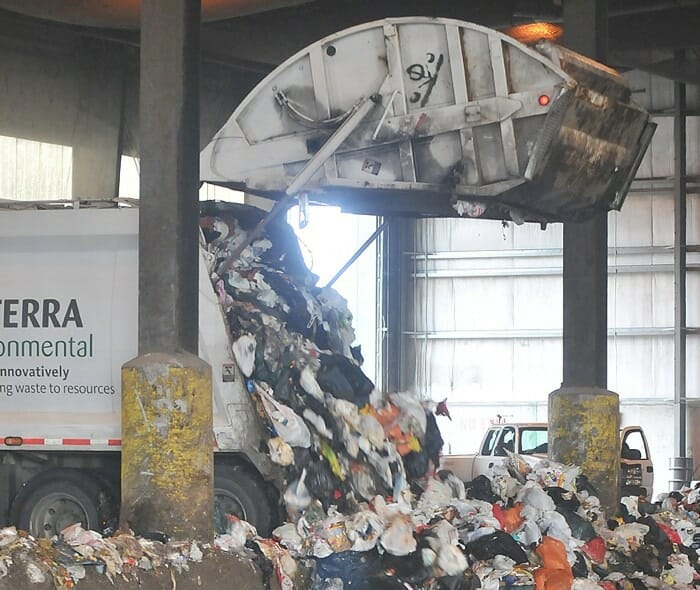Article source from Maple Ridge News – http://www.mapleridgenews.com/news/169837436.html
Commercial waste trucks that dump garbage at Metro transfer stations, such as this one in Surrey, pay $107 per tonne. But it costs much less for some haulers to take garbage to a private transfer station in Abbotsford instead, skirting Metro tipping fees.
By Jeff Nagel – Surrey North Delta Leader
Metro Vancouver risks losing much of the tipping fees that underpin the region’s recycling system unless it blocks commercial waste haulers from trucking garbage east to Abbotsford.
Cost is the main reason why 50,000 tonnes of garbage is already trucked out-of-region each year, often rolling right past Metro transfer stations while adding to congestion and air emissions.
Some outbound haulers use an Abbotsford transfer station or other out-of-region landfill for as little as $70 per tonne, while Metro Vancouver’s tipping fee is $107.
The difference, officials say, is because Metro’s fees also support a full range of recycling initiatives in the region, as well as planning and administration costs.
They plan to intervene to keep the current trickle of outgoing trash from growing to a flood.
The 50,000 tonnes exiting the region translates into $5.3 million a year in lost tipping fees, but that could soar to more than $60 million if all the haulers who handle commercial, industrial, institutional and multi-family waste pickup in the region followed suit.
Solid waste department manager Paul Henderson said a full migration of those sectors, which account for 60 per cent of Metro’s 1.1 million annual tonnes of waste, would likely force the region to slash service levels while making residential homes pay a much bigger share of the system’s cost.
It’s not just money at stake but the effectiveness of Metro’s recycling rules, because customers who use outbound haulers don’t have to abide by the disposal bans Metro imposes to keep recyclable materials from being dumped.
“That material avoids the bans and prohibitions we have in place in the region to encourage recycling,” Henderson said.
Metro is expected to propose a licensing system that forces haulers to use Metro transfer stations or designated in-region private recycling operators.
Henderson said curbing the outbound flow is “critical” as the region is committed to intensify its recycling efforts to boost diversion from 55 per cent to at least 70 per cent.
“If we do nothing there is a strong likelihood we would be unable to implement all the activities and achieve the goals laid out in the solid waste management plan,” he said.
Tipping fees have steadily climbed more than 60 per cent since 2006, when they were just $65 per tonne.
But cutting them isn’t a good option, Henderson said, because they are a powerful tool to encourage recycling.
“Our system is based on full cost recovery,” he said. “We wouldn’t artificially inflate our tipping fees to further increase recycling but we believe it’s a very important tool.”
After a 10 per cent increase last year, Metro expects to keep its tipping fee frozen at $107 for 2013.
Metro’s fees are the same as the Capital Regional District in Victoria and less than the $115 in Nanaimo, but more than Calgary’s $98 or Toronto’s $100 tipping fee.
Metro will consult industry ahead of a final decision next spring on exactly what regulations to impose.

